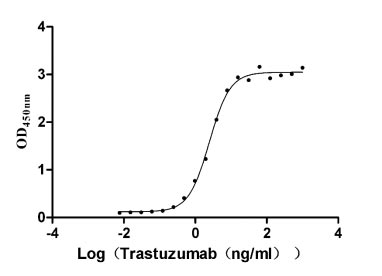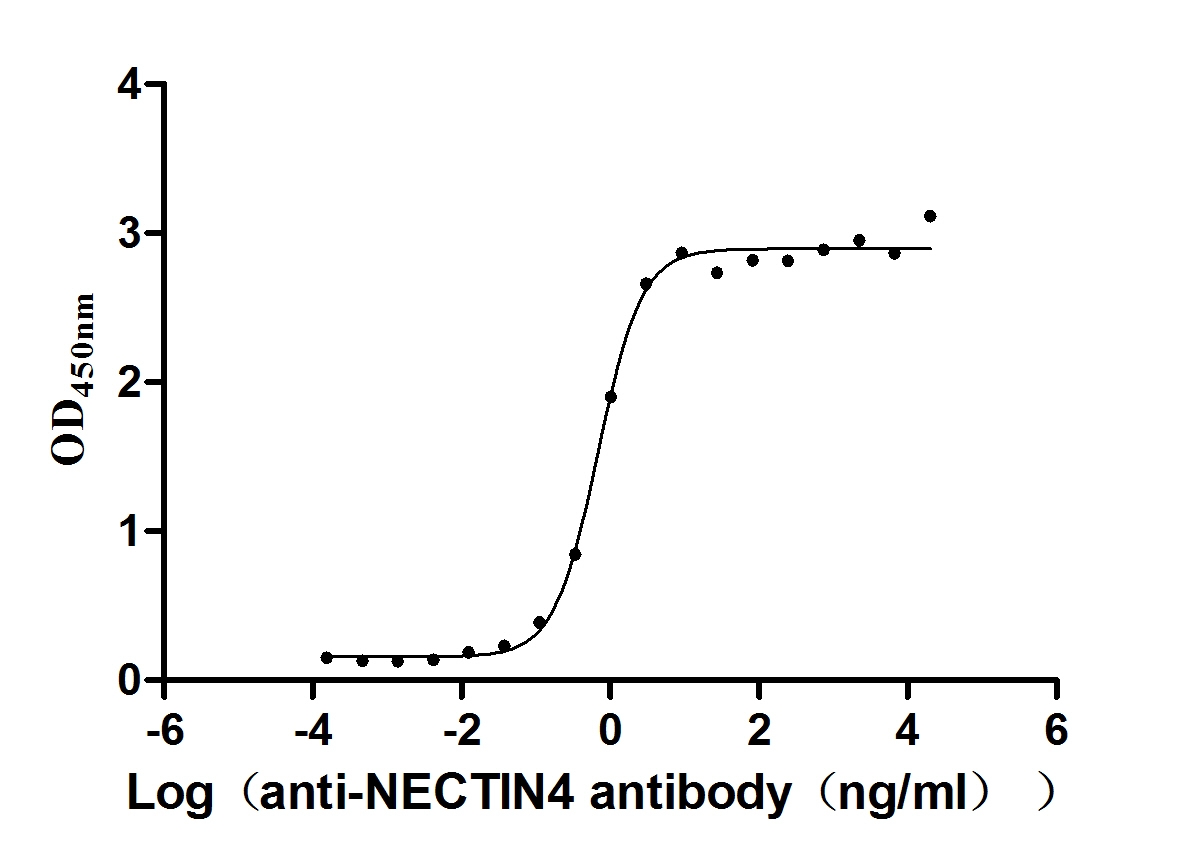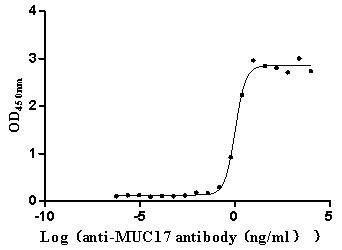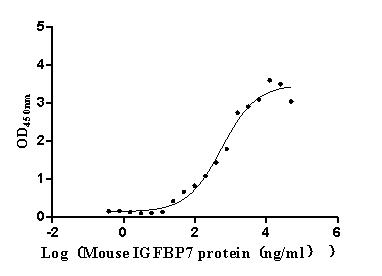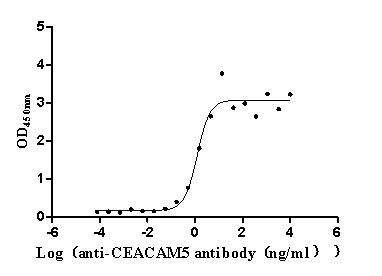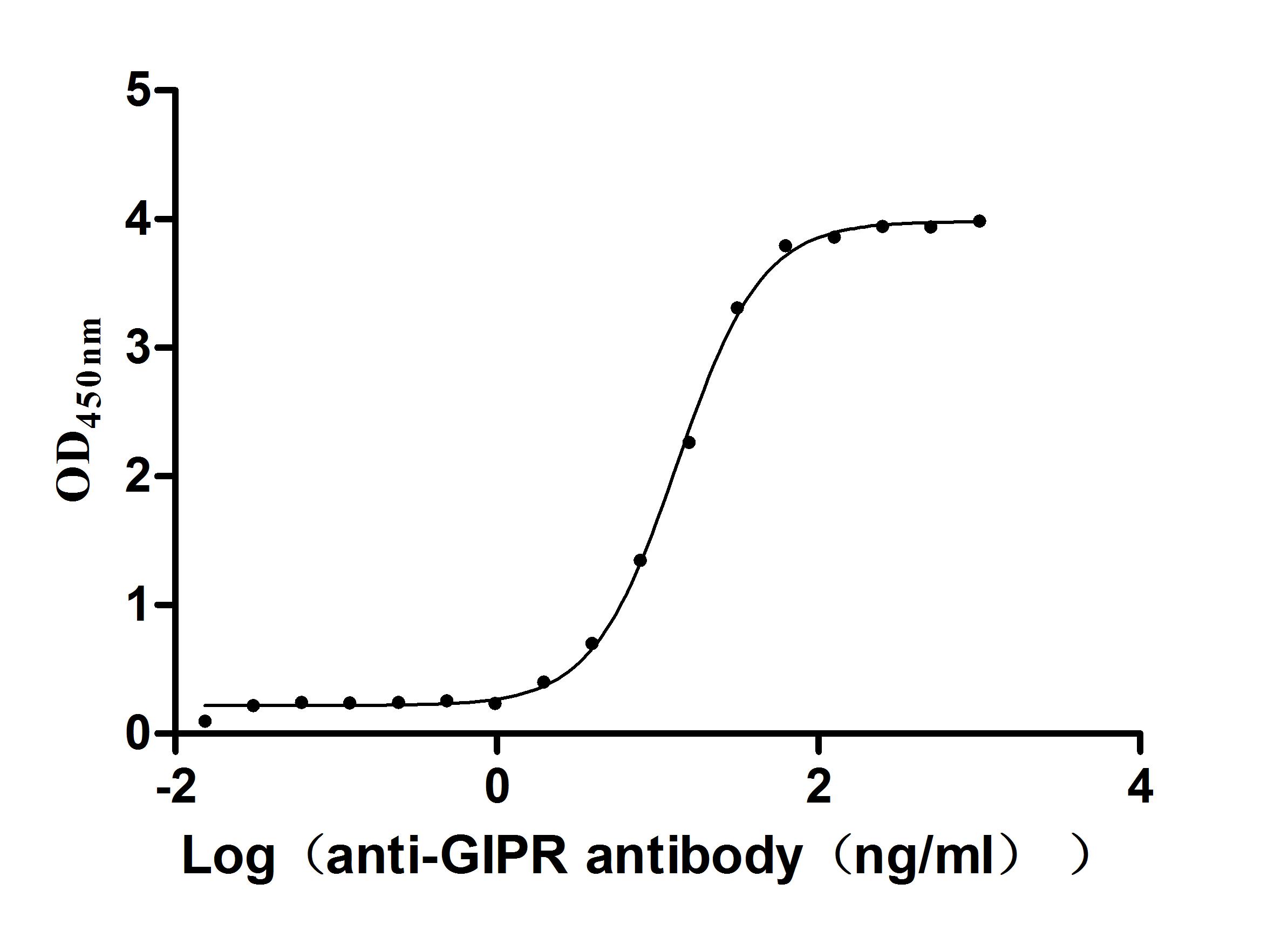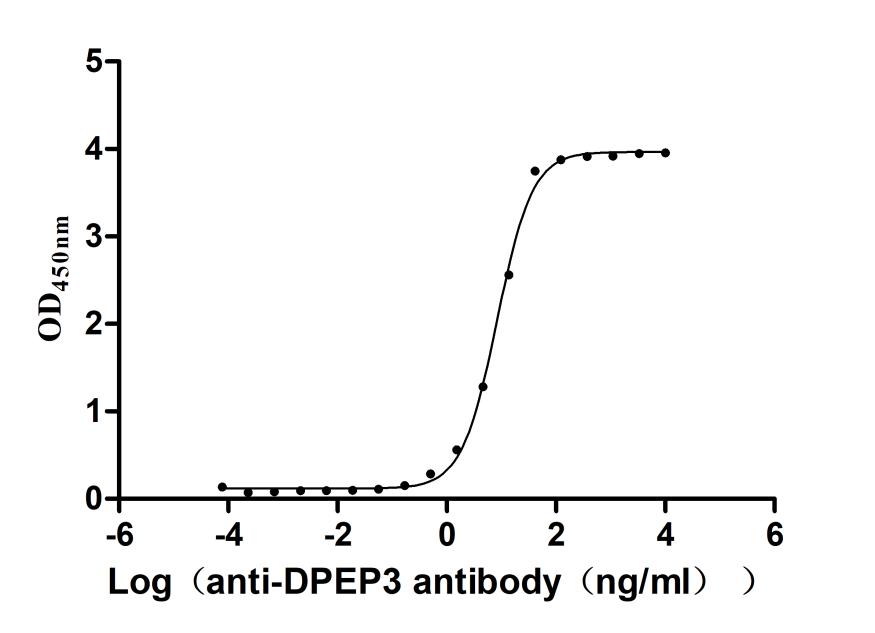Recombinant Human Acetylcholine receptor subunit epsilon (CHRNE)
-
货号:CSB-CF005400HU
-
规格:
-
来源:in vitro E.coli expression system
-
其他:
产品详情
-
基因名:CHRNE
-
Uniprot No.:
-
别名:CHRNE; ACHRE; Acetylcholine receptor subunit epsilon
-
种属:Homo sapiens (Human)
-
蛋白长度:Full Length of Mature Protein
-
表达区域:21-493
-
氨基酸序列KNEELRLYHHLFNNYDPGSRPVREPEDTVTISLKVTLTNLISLNEKEETLTTSVWIGIDW QDYRLNYSKDDFGGIETLRVPSELVWLPEIVLENNIDGQFGVAYDANVLVYEGGSVTWLP PAIYRSVCAVEVTYFPFDWQNCSLIFRSQTYNAEEVEFTFAVDNDGKTINKIDIDTEAYT ENGEWAIDFCPGVIRRHHGGATDGPGETDVIYSLIIRRKPLFYVINIIVPCVLISGLVLL AYFLPAQAGGQKCTVSINVLLAQTVFLFLIAQKIPETSLSVPLLGRFLIFVMVVATLIVM NCVIVLNVSQRTPTTHAMSPRLRHVLLELLPRLLGSPPPPEAPRAASPPRRASSVGLLLR AEELILKKPRSELVFEGQRHRQGTWTAAFCQSLGAAAPEVRCCVDAVNFVAESTRDQEAT GEEVSDWVRMGNALDNICFWAALVLFSVGSSLIFLGAYFNRVPDLPYAPCIQP
Note: The complete sequence including tag sequence, target protein sequence and linker sequence could be provided upon request. -
蛋白标签:N-terminal 10xHis-tagged
-
产品提供形式:Liquid or Lyophilized powder
Note: We will preferentially ship the format that we have in stock, however, if you have any special requirement for the format, please remark your requirement when placing the order, we will prepare according to your demand. -
缓冲液:Lyophilized from Tris/PBS-based buffer, 6% Trehalose, pH 8.0
-
储存条件:Store at -20°C/-80°C upon receipt, aliquoting is necessary for mutiple use. Avoid repeated freeze-thaw cycles.
-
保质期:The shelf life is related to many factors, storage state, buffer ingredients, storage temperature and the stability of the protein itself.
Generally, the shelf life of liquid form is 6 months at -20°C/-80°C. The shelf life of lyophilized form is 12 months at -20°C/-80°C. -
货期:Basically, we can dispatch the products out in 1-3 working days after receiving your orders. Delivery time may differ from different purchasing way or location, please kindly consult your local distributors for specific delivery time.Note: All of our proteins are default shipped with normal blue ice packs, if you request to ship with dry ice, please communicate with us in advance and extra fees will be charged.
-
注意事项:Repeated freezing and thawing is not recommended. Store working aliquots at 4°C for up to one week.
-
Datasheet & COA:Please contact us to get it.
相关产品
靶点详情
-
功能:After binding acetylcholine, the AChR responds by an extensive change in conformation that affects all subunits and leads to opening of an ion-conducting channel across the plasma membrane.
-
基因功能参考文献:
- Study found a pretest probability of CHRNE c.130dupG mutation of 31.9% in at least one allele of CMS patients, and when considering only homozygous patients the percentage is still high (26.4%); percentages notably increase ifonly patients with impaired eye movement and improvement of symptoms with pyridostigmine are considered. PMID: 29383513
- Specific mutations in COLQ, RAPSN, and CHRNE occur in specific ethnic populations in Israel and should be taken into account when the diagnosis of congenital myasthenic syndrome is suspected.. PMID: 28024842
- mutational analysis of CHRNE revealed a homozygous 1293insG, which is a well-known low-expressor receptor mutation in patients with epidermolysis bullosa simplex and congenital myasthenic syndrome. PMID: 21175599
- This study provied that new mouse model for the slow-channel congenital myasthenic syndrome induced by the AChR epsilonL221F mutation. PMID: 22178625
- Three siblings have a clinical history and examination findings typical of homozygous CHRNE mutations; clinical presentation of congenital myasthenia subtypes is variable, and accurate genotyping is essential in choosing appropriate treatment. PMID: 21150643
- Targeting nAChR could offer a strategy for reducing neurodegeneration secondary to hyperphosphorylation of protein tau. PMID: 21715663
- The mutations in the varepsilon subunit altered Ca(2+) permeability of AChR-channels, with varepsilon(L269F) increasing P(f) and varepsilon(I257F) decreasing it. PMID: 21470676
- analysis of symmetry at the extracellular domain-transmembrane domain interface in acetylcholine receptor channel gating PMID: 20864527
- two binding sites differ by roughly 10-fold in the affinity of the shut receptor for ACh in the wild type, and that in the epsilonL221F mutation the lower affinity is increased so the sites become more similar. PMID: 12562900
- There was deletion in exon 7 of CHRNE. We cloned the entire CHRNE spanning 12 exons and 11 introns and expressed it in COS cells PMID: 14532324
- It was found that mutations within muscle AChRs are the most common cause of CMS. The majority are located within the epsilon-subunit gene and result in AChR deficiency. PMID: 14592868
- AChR epsilon-chain peptides are tested for their in vitro ability to activate peripheral blood mononuclear leukocytes of myasthenia gravis (MG) patients; MG patient cells are stimulated, whereas cells from nonmyasthenic subjects do not respond. PMID: 15652413
- Reported is a patient with a congenital myasthenic syndrome due to two compound heterozygous mutations of the CHRNE gene. T PMID: 16087917
- a patient with a slow-channel congenital myasthenic syndrome who carries a novel slow-channel mutation(novel valine to phenylalanine mutation ) in the epsilon subunit of the acetylcholine receptor. PMID: 16198106
- the intrinsically high Ca2+ permeability of human AChRs probably predisposes to development of the endplate myopathy when opening events of the AChR channel are prolonged by altered AChR-channel kinetics PMID: 16527851
- enhanced Ca2+ permeability of the mutant receptors overrides the protective effect of desensitization and, together with the prolonged opening events of the AChR channel, is important in slow channel syndromes PMID: 17272341
- Upon activation of AChR, GABP recruits the histone acetyl transferase (HAT) p300 on the AChR epsilon subunit promoter, whereas it rather recruits the histone deacetylase HDAC1 when the promoter is not activated. PMID: 17304221
- This is the first synonymous mutation in CHRNE known to generate a cryptic splice site, and mRNA quantification strongly suggests that it is the disease-causing mutation. PMID: 17363247
- The greater abundance of mRNA for AChR epsilon-subunit than for other subunits suggests that the AChR epsilon-subunit may play a distinctive role in autosensitization in MG-associated thymomas, particularly those of type A or AB. PMID: 18657869
- These results strongly support the hypothesis that epsilon1293insG mutations in a myasthenic syndrome derives from an ancient single founder event in the North African population. PMID: 19064877
- We have identified mutations within the acetylcholine receptor (AChR) epsilon-subunit gene underlying congenital myasthenic syndromes in nine patients (seven kinships) of Dutch origin. PMID: 19544078
显示更多
收起更多
-
相关疾病:Myasthenic syndrome, congenital, 4A, slow-channel (CMS4A); Myasthenic syndrome, congenital, 4B, fast-channel (CMS4B); Myasthenic syndrome, congenital, 4C, associated with acetylcholine receptor deficiency (CMS4C)
-
亚细胞定位:Cell junction, synapse, postsynaptic cell membrane; Multi-pass membrane protein. Cell membrane; Multi-pass membrane protein.
-
蛋白家族:Ligand-gated ion channel (TC 1.A.9) family, Acetylcholine receptor (TC 1.A.9.1) subfamily, Epsilon/CHRNE sub-subfamily
-
数据库链接:
HGNC: 1966
OMIM: 100725
KEGG: hsa:1145
STRING: 9606.ENSP00000293780
UniGene: Hs.654535
Most popular with customers
-
Recombinant Human Receptor tyrosine-protein kinase erbB-2 (ERBB2), partial (Active)
Express system: Mammalian cell
Species: Homo sapiens (Human)
-
Recombinant Human Glucagon receptor (GCGR), partial (Active)
Express system: Mammalian cell
Species: Homo sapiens (Human)
-
Recombinant Human Nectin-4 (NECTIN4), partial (Active)
Express system: Mammalian cell
Species: Homo sapiens (Human)
-
Recombinant Human Mucin-17 (MUC17), partial (Active)
Express system: Mammalian cell
Species: Homo sapiens (Human)
-
Recombinant Mouse Complement component C1q receptor (Cd93), partial (Active)
Express system: Mammalian cell
Species: Mus musculus (Mouse)
-
Express system: Mammalian cell
Species: Homo sapiens (Human)
-
Recombinant Macaca Gastric inhibitory polypeptide receptor(GIPR), partial (Active)
Express system: yeast
Species: Macaca fascicularis (Crab-eating macaque) (Cynomolgus monkey)
-
Recombinant Macaca fascicularis Dipeptidase 3(DPEP3) (Active)
Express system: Mammalian cell
Species: Macaca fascicularis (Crab-eating macaque) (Cynomolgus monkey)


